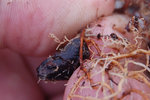I purchase a lot of nursery trees for future bonsai. I sift the bark from the nursery soil and add it to lava and pumice in equal parts. I don't know if it's composted or not, but it's been in the pot for years.
That would be considered composted bark. I re-use bark from repotting orchids. ''True composting'' happens at an elevated temperature in a compost pile, usually left as a pile until it stops generating large amounts of heat. In North America, a few months to a year. BUT similar chemical changes happen more slowly at room temperatures (ambient temps outdoors) with bark being used in a pot. Bacteria, fungi, yeasts, and other organisms do the same degrading of the bark that a compost pile would do in a relatively short time. The wood sugars are degraded to simpler compounds, the cellulose is partially decomposed. The hemicellulose and various lignins that give rigidity to wood and bark are broken down into simpler ''wood sugars'' like xylitol, xylose, arabinose and other 5 carbon sugars and phenolics. Basically the easy to digest portions of wood and bark are degraded, leaving the slower to decompose parts in the bark & wood. The openings created by the decomposition where materials were removed by decomposition make the bark chips more like miniature sponge chips. And the remaining organics are great food for mycorrhiza. Eventually bark crumbles into smaller and smaller pieces.
Fir bark can decompose in a pot from fresh to crumbles of dust in about 7 to 8 years in the Chicago area, quicker if you fertilize more often, which encourages certain decomposition organisms (I don't know just which ones). Radiata pine bark will last a good 10 to 15 years before it is reduced to powder. For epiphytic orchids, in fir bark repotting is usually at 2 years, for radiata repotting is usually at or before 5 years. This time is plenty to begin make the water holding and porosity of more ideal as a potting mix for trees.
I often use fresh bark, of both douglas fir (fir bark) and radiata bark, fresh as is in my bonsai mix. I try not to repot my trees very often, especially pines and junipers I do try to avoid repotting more than once every 5 to 10 years if I can get away with it. Often I can't, but I try to leave my tree roots alone as long as I can. The use of fresh bark buys me more time, but it does mean that the mix that might have been somewhat ''dry'' will begin to hold much more water the second and third years. But if you adjust watering schedules as needed. Water your trees when they need it, not when you want to. Then these changes do not pose a problem.
The chemistry of wood and bark decomposition does lend itself to keeping a potting mix more acidic. Bark in various stages of decomposition have a fairly high CEC, cation exchange capacity, which does change as different components of bark are consumed by microbes.
SO what was the question? Yes, bark that is used, can be considered ''composted''.
Caveat - traditional compost pile composting generates heat, bark composted by that method is essentially pasteurized in the process, it is not sterile, but a large range of organisms are killed by the process. Most of the catastrophic fungal pathogens are killed by high temperature composting.
However, if you are conscious of potential disease issues, used bark from pots with healthy trees are not a problem. Just dispose of bark from trees that died of diseases like anthracnose and other fungal or bacterial catastrophes .
I usually don't worry, as healthy soil microbes will inhibit most fungal and bacterial diseases.








